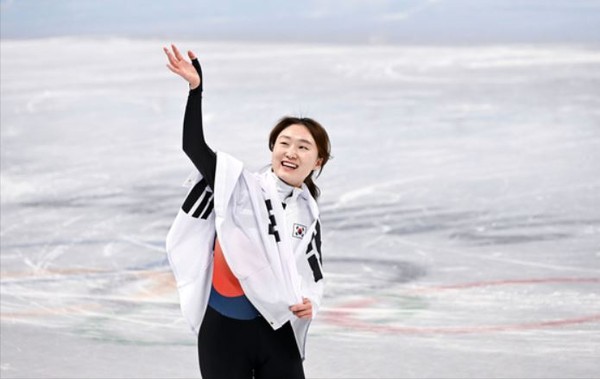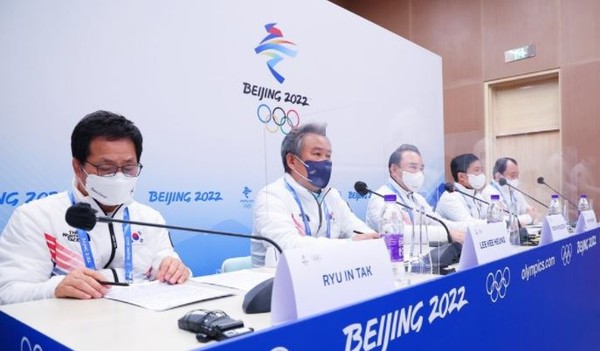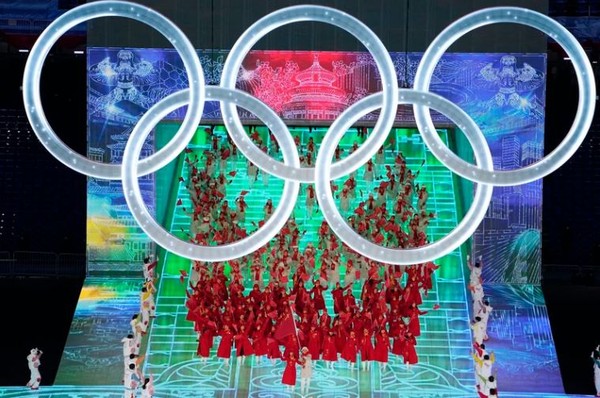KSOC President Lee praises strong efforts by Korean athletes
The South Korean team won two gold medals, five silver medals and two bronze medals, finishing 14th overall at the 2022 Beijing Winter Olympics that wrapped up its 17-day run on Feb. 20.
The Korean team has achieved the desired goal. Ahead of the competition, the Korean Sport & Olympic Committee has set a relatively low goal of 1 to 2 gold medals and 15th overall.
The country captured its first Winter Games medals at Albertville 1992 and has won at least two gold medals at every competition since.

There were a few reasons why the KSOC had set a low bar for its athletes to clear. This would be the first Winter Olympics to take place during the global COVID-19 pandemic, and all athletes, along with other Olympic-related personnel, were required to stay inside a bubble, or the "closed-loop system" as the organizers termed it, the whole time.
It was difficult to predict what kind of impact the situation would have on athletes' physical and mental preparations.
The quality of competition had improved across the board. Even in short track, one of South Korea's biggest goldmines, other countries had caught up, to a point where it was not a guarantee that South Korea would simply strut in and leave with a handful of medals.
Anyway, short track speed skating was Korea's strongest sport in Beijing, with both gold medals and three of the five silver medals coming from the sport.
Hwang Dae-heon garnered Korea's first gold medal in the men's 1,500 meters, with Choi Min-jeong adding that all-important second gold medal in the women's 1,500 meters.
Both Korean relay teams won silver in their respective events — Hwang was joined by Park Jang-hyuk, Kwak Yoon-gy and Lee June-seo in the men's 5,000 meters, with Choi joined by Kim A-lang, Seo Whi-min and Lee Yu-bin in the women's 3,000 meters. The final short track medal also went to Choi — a silver medal in the women's 1,000 meters.

Those short track medals put Korea at the top of the table in the sport, continuing the team's longstanding dominance in the sport. While Korea won one less gold medal than at the 2018 PyeongChang Olympics, it won two more silver medals.
All four of Korea's remaining medals came from speed skating. Kim Min-seok won Korea's first medal of the Beijing Games, bronze in the men's 500 meters, with Kim Min-seok adding a second bronze medal in the men's 1,500 meters. Chung Jae-won and Lee Seung-hoon then won Korea's final two medals of the Olympics, silver and bronze respectively in the men's mass start.
The 2022 Beijing Olympics officially ended on Sunday night with the closing ceremony.
Meanwhile, Lee Kee-heung, president of the Korean Sport & Olympic Committee (KSOC), praised strong efforts by the country's athletes at Beijing 2022 on Feb. 20.

Lee held a press conference in the Chinese capital to discuss South Korea's performance at the 2022 Winter Games.
Lee said South Korean athletes overcame many challenges, such as lack of training caused by the global COVID-19 pandemic and controversial officiating, to meet that objective.
Lee said, "Our athletes delivered memorable performances to give fans back home something to cheer about. By winning nine medals from short track and speed skating, we were able to confirm our international competitiveness in those sports once again."
South Korea was shut out of medals on snow and track, after winning two medals in sliding events and another in snowboard at the previous Winter Games in 2018 in PyeongChang.
Related to this, Lee said, “There is an urgent need to develop new Olympic-caliber athletes in non-skating events, with South Korea scheduled to host the 2024 Winter Youth Olympics.”
He said that Korea’s national federations will find new ways to train and select Olympic athletes.
"We'll try to use that occasion to bring about changes to the Korean Peninsula through sports. Hopefully, it will be a major celebration of peace with many young athletes from around the world on hand," he added.

